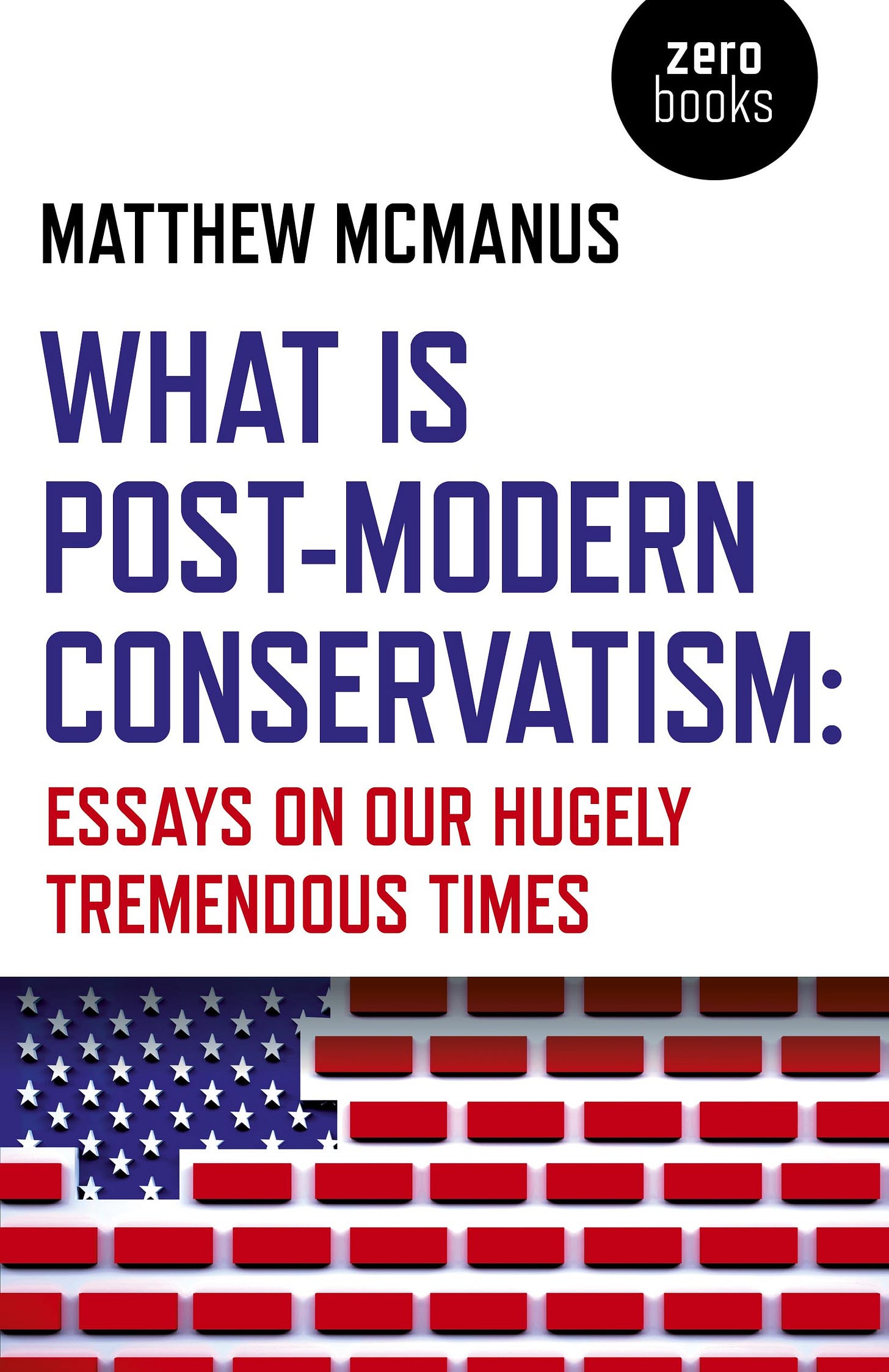Glenn Greenwald’s Leaked Intimate Videos and The Politics of Sign Management
How Glenn's fetish tape speaks to postmodern conservatism and the politics of sign management.
(The abyss of postmodern conservatism starring back.)
This week, a video of Glenn Greenwald engaged in a fetish act was leaked without his consent. It involved some kind of humiliation fetish, feet, fishnets… It was the whole nine yards…
I cannot begin to describe how uninterested I am in the tape… Please, I don’t want to see the video… I don’t care that he engages in these acts in private… Ugh… I just don’t care…
However, the response to this incident has brought to light a few features of the state of modern conservatism.
In this article, I am going to explain Matthew McManus’s idea of postmodern conservatism, in which conservatism loses its moral philosophy in favor of identity based, grievance politics. Then, I am going to draw on Jean Baudrillard’s “Simulacra and Simulation” to explain how the above leads to what I am calling a politics of sign management.
From Policy To Identity
Greenwald is a gay man and naturally, his sex tape features him with another man… Not there’s anything wrong with that…
Greenwald, who has become a conservative darling over the past decade, maintains a sexual identity that appears at odds with the values traditionally espoused by much of his audience.
While openly gay, Greenwald is embraced by many on the right because of his antagonism toward the Democratic party, “wokism”, Ukraine, academics, as well as his regular appearances on Fox News.
(Holocaust revisionist Darryl Cooper on Greenwald’s martyrdom)
Historically, Republican orthodoxy was explicitly anti-gay. Opposition to marriage equality and resistance to LGBT inclusion in the military were central pillars of conservative politics throughout the 1990s and early 2000s.
George W. Bush’s 2004 re-election campaign, for instance, leaned heavily on support for state-level bans on same-sex marriage. Don’t Ask, Don’t Tell, implemented under Clinton and defended by many Republicans, remained in place until 2011.
Today, direct opposition to gay rights has largely receded from official party platforms, replaced by more coded forms of resistance. Most Republican leaders have stopped calling for the repeal of marriage equality, recognizing its legal and cultural entrenchment after Obergefell v. Hodges (2015).
Instead, conservative discourse has shifted toward symbolic and rhetorical conflicts. Contemporary right-wing talking points focus on claims that “the LGBT agenda has gone too far,” portraying the movement as ideologically captured by “cultural Marxism,” a phrase used by figures like Ben Shapiro and Jordan Peterson.
Ron DeSantis’s “Don’t Say Gay” bill in Florida is a textbook case: it doesn’t reverse past gains for gay adults, but reorients conservative energy toward controlling cultural influence through education policy.
The concern is no longer who can marry or serve in the military, but which identities are seen as legitimate within the public sphere, particularly around children, curriculum, and media.
This repositioning allows conservatives to maintain a symbolic front in the culture war while tolerating figures like Greenwald who violate their older moral codes.
It reflects a shift from principled ideology to a politics of coalition-building around shared enemies. The litmus test is no longer sexual morality, but whether one helps advance or obstruct the group’s antagonistic project.
Postmodern Conservatism
McManus argues that postmodern conservatism emerges when traditional conservative values are hollowed out and replaced with identity-driven grievance politics.
Rather than defending long-standing institutions or moral frameworks, postmodern conservatives embrace narratives of victimhood, tribal loyalty, and symbolic conflict.
Furthermore, McManus writes that today’s right-wing movements, having been hollowed out of any moral or political philosophy, are rooted in reactionary posture.
The right constructs an image of the left as corrupt or degenerate and then defines their politics in contrast to it. This style of negative identity formation means that the right is mobilized by their hatred of the left - which they see as represented in the prevailing academic and media institutions.
This development results in a politics of grievance mongering, rather than policy or values.
There are other tenets of postmodern conservatism that McManus highlights, such as anti-intellectualism, a tendency to undermine rather than conserve traditional institutions like the courts, universities, the press, public health bodies, and electoral systems, and the embrace of populist strongmen over deliberative democracy - but the one I want to focus on is this…
Right-wing politics today is a victimary narrative - one where conservatives see themselves as persecuted by left-wing elites forcing drag queens and vaccines onto their children.
Notice how there is no moral framework here? It is pure grievance and affect, a symbolic battle over whether certain identity categories - like transgender people - are legitimate or worthy of representation.
These political actors and movement demonstrate contempt for their opponents. They affiliate with people who think, look, and talk like them, and are wary of outsiders who don’t share that identity. And above all else, they are dismissive of possible facts “truths” that don’t accord with tradition and “common sense”, calling them “fake news” and other cute neologisms. In other words, they’ve become what they claimed to hate. We’re all the poorer for it. - McManus, (Postmodern conservatism: Or how the right became what it hated.)
For someone to be included on the right, all that matters is that they attack the left. Your value lies in your usefulness to the narrative, not in your alignment with any moral philosophy.
This is why conservatives - who are otherwise spouting anti-LGBT rhetoric - will defend Greenwald’s gay fetish tape with enthusiasm, the irony being totally lost on them.
It’s also why the right has propped up figures like Dave Rubin, Milo Yiannopoulos, Blaire White or Caitlyn Jenner.
Hell, many of the conservative grifters have some story about being a faux liberal disenfranchised by their own side e.g. Jordan Peteron, Russell Brand…
Dave Rubin and Glenn Greenwald actually tick both of these boxes i.e. gay and faux-liberal.
Not to mention, many figures in the manosphere like Andrew Tate and Sneako supposedly converting to Islam… You know, the same religion the right spent decades painting as an existential threat to Western values?
(Andrew Tate holding The Quran while being escorted by police… It really doesn’t get more postmodern than that…)
If you hate the same people and are useful to the narrative, you can become a right-wing darling. It doesn’t really matter what your values are.
The reason postmodern conservatism is terrifying is that it parallels many qualities of fascism, as identified by philosophers like Jason Stanely.
Postmodern conservatism aligns with several of Stanley’s pillars of fascist politics, particularly grievance-based victimhood and anti-intellectualism.
Like fascist movements, it relies on emotional narratives of national decline, blames internal enemies (often cultural elites or marginalized groups), and discredits reasoned debate in favor of tribal loyalty.
In both cases, truth is subordinated to identity, and politics becomes a performance of belonging and group conflict.
Politics of Sign Management
(Jean Baudrillard’s text featured as an easter egg in the first Matrix movie.)
“Simulacra are not copies of the real. They are truth in their own right… The simulation is no longer that of a territory, a referential being or a substance. It is the generation by models of a real without origin or reality: a hyperreal.”
In “Simulacra and Simulation”, Baudrillard argues that in late capitalist societies, signs no longer refer to real things. Instead, they refer only to other signs, forming a self-contained, self-referential system of meaning.
To illustrate this, I find Baudrillard’s commentary on the Watergate Scandal to be the most interesting…
“Watergate was not a scandal, but a simulation of scandal… to reinject a morality, a truth, a responsibility into public life… as if the whole system were not rotten at its base.”
Rather than denying Nixon’s corruption, Baudrillard is stating that the spectacle of justice is a simulation of accountability intended to mask the deeper rot of power, lobbying, imperialism, and structural violence.
Baudrillard saw Watergate’s treatment in the press as performative, an act designed to stabilize belief in the system. The people could think “we caught the baddies!” before continuing to live their lives under a system that would later profit corporations billions of dollars from no-bid contracts over an invasion based on manipulated intelligence - leading to mass civilian casualties, torture programs, and a permanent surveillance infrastructure…
In the same way, the postmodern conservatives war against drag queen story time is a simulated scandal to create the appearance of traditional values.
Politics, under this logic, becomes about managing the appearance of truth, morality, or tradition rather than enacting any substantive version of them.
Postmodern conservatives appeal to “family values” - they label LGBT educators as “groomers” - but their defense of figures like Greenwald shows these values are purely symbolic.
They appeal to “patriotism”, yet routinely mock their fellow Americans as college-educated idiots, weak men, brainwashed sheep, and low-information voters - while not to mention, also justifying the violent disruption of the constitutional process meant to certify a democratic election.
They say “don’t tread on me” and then support the militarization of the police, no knock raids, qualified immunity and voter suppression laws.
(My brother in Christ, who do you think will be doing the treading ??)
This isn’t just hypocrisy hunting… Postmodern conservatism has become untethered from moral coherence and is solely concerned with the politics of sign management.
The politics of sign management refers to a mode of political practice where symbols, slogans, and identities are deployed to signal allegiance and manufacture legitimacy, regardless of their connection to material reality, consistent values, or policy outcomes.
It is a spectacle - a simulation of values…
The conservative movement no longer needs to actually uphold moral values; it only needs to signal them.
Hence, the paradox of figures like Glenn Greenwald, Dave Rubin, Blaire White etc being embraced by audiences who also endorse anti-LGBT rhetoric.
Their personal lives contradict the supposed values of their base, but this contradiction is irrelevant because their function is symbolic.
They are signs of rebellion against the left, and their utility lies in what they represent within the culture war economy. Conservatism thus becomes a politics of sign management: a system where performative gestures, symbolic enemies, and aesthetic alignment matter more than truth, action, or coherence.
The politics of sign management also resembles “post-truth” politics… which in turn resembles what Harry Frankfurt calls “bullshit”… it is all language used without concern for whether it’s true or false.
In this mode, statements are judged by how well they signal identity or achieve power objectives, not by their accuracy.
Closing Remarks
So, we saw Glenn Greenwald getting up to some freaky antics - there is nothing wrong with that - but there is an irony to conservatives who have built their platform on delegitimizing LGBT identity coming out to defend his fetish tape.
My reservations about talking about these trends is that they are just that… trends.
I have also seen many posts on X hurling f-slurs at Greenwald i.e. far right users denouncing him for being gay.
These concepts aren’t perfect. However, I think they do capture a broader shift, even if there are individual exceptions.
These concepts of postmodern conservatism and the politics of sign management I think are interesting ways to describe what is going on.
Rather than being the side of “objective truth” fighting against relativist left-wingers, conservatives are engaged in their own choreography of identity.
It’s just that this choreography involves undermining institutional knowledge and establishing illiberal democracies.













Sadly I observe most of the things you rightfully criticize here about the right, on the left as well... we are so screwed 😭
Just change the name to tds instead of tdt,and you might attract more people. By the way terrible article,50% of the people disagree on stuff therefor they are hypocrites. It is like going to a sports game and pointing two people who cheer for the team but have a different opinion who should the coach be and using that as a sign to call them dumb and hypocritical. The real reason is they hate wokeness, and in order to oppose it they form coalitions. But if you had any working braincells you would make bank in private sector with a stem degree and not trying to grift people by pretending to learn about philosophy degree,pathetic.